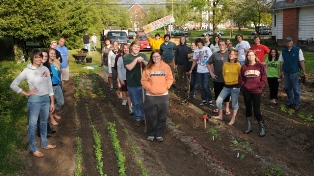Talking 'Trash' at SU
SALISBURY, MD---Salisbury University Physical Plant Director Kevin Mann loves talking trash.
That doesn’t mean he has any particular opinion about your mother. In fact, if he was to pick a fight, his opening line more likely than not would begin, “Your momma’s so sustainable… .”
No, the kind of trash Mann enjoys discussing is the kind that ends up in landfills—and his main interest is keeping what he can out of them. For that reason, he was perhaps more elated than anyone when Salisbury University was able to report the recycling of more than 41 percent of trash covered under the Maryland Recycling Act in 2008—up from just 27 percent in 2007.
“Whenever we talk recycling, we’re talking trash,” he said.
Some of the numbers are mindboggling. In 2008 the campus recycled more than 334 tons of mixed paper (up from just over 244 tons in 2007), more than two tons of aluminum cans (up from not quite 1.5 the year before) and a whopping 194.12 tons of carpet. The recycled floor coverings came from a single project, the renovation of the campus’ Blackwell Library. Carpet recycling is now standard in all of SU’s carpet removal Requests for Proposals.
The numbers increase dramatically when taking into account materials not included in the Maryland Recycling Act. In 2008 the campus recycled more than 1,773 tons of concrete, mostly through construction projects, 1.4 tons of motor oil and 540 pounds of antifreeze.
In all, SU recycled more than six million pounds of materials last year. So why the sudden increase? Mann credits it to leadership at the top, citing President Janet Dudley-Eshbach’s joining more than 400 other college and university leaders across the nation last spring in the fight against global warming by signing the American College and University Presidents Climate Commitment.
With her signature, Dudley-Eshbach pledged to move SU toward climate neutrality, with no net greenhouse gas emissions.
“Overall, campus awareness has gone up with the presidential commitment and our sustainability initiatives as a whole,” Mann said.
SU has focused on sustainability since its recycling program began in 1990, and participation and new initiatives have seen a vast increase in recent years. In 2006, for example, SU entered partnerships with Pepco Energy Services, Inc. and the Maryland Department of General Services to implement several campuswide environmental friendly measures aimed at energy conservation. From less energy-consuming lighting to more efficient plumbing fixtures, the initiative is guaranteed to save some $6 million in energy costs over the next 15 years.
More recently, the University has incorporated sustainable designs in its building plans. Contractors nationwide may be getting used to installing ultra-efficient HVAC systems, energy-efficient “daylight harvesting” windows and roofing materials chosen to reduce heat island effect, but Mann still gets confused looks when he tells architects to reserve ample space for trash and recycling bins to stand side by side in building alcoves and outdoor pads.
“You have to make it convenient for people to choose,” he said. “If they can throw their recyclable materials into a trash can or a recycling bin, many will chose the recycling bin. But if the only immediate choice is a trash can, they aren’t going to search for a recycling bin.”
Full-scale recycling receptacles were added along with large trash collection bins at SU’s Henson Science Hall following its opening in 2003. It wasn’t until the opening of the University’s new $65 million Teacher Education and Technology Center (TETC) in 2003, however, that an SU building was designed complete with its own recycling room. Plans for the campus’ new Franklin P. Perdue School of Business building, slated to open in 2011, follow suit.
“With Henson, recycling was an afterthought,” said Rebecca Rosing-Johnson, SU grounds and horticulture manager. “With the TETC and the Perdue building, it’s at the forefront.”
Included in the TETC design was a trash compactor, which is emptied only a few times per month versus a traditional trash receptacle being emptied multiple times a week, requiring less fuel for garbage collection.
In designing the Perdue building, engineers are hoping to take sustainability one step further, figuring out 
While much of SU’s large-scale sustainability plans are included in its infrastructure, students aren’t left out of the picture, either. Last year, students in Dr. James Hatley’s philosophy classes built a compost pile on campus to help fertilize wildlife and rain gardens at the building housing the Philosophy Department.
Since then, students have independently built another compost pile and are planning at least one more. Student volunteers collect food scraps from SU’s Commons dining hall to add to the piles.
“We’ve got so much coming in that we’re going to need a whole series of these across campus eventually,” said Hatley.
Plans call for any excess compost to be donated to the University’s Horticulture Department or sold at cost to local gardeners so they may also share in the initiative. From recycling entire buildings during demolition and construction projects to helping tulips grow in local backyards, few projects are too large or small for SU to consider if it helps the campus become just a bit greener.
For more information call 410-543-6030 or visit the SU Web site at www.salisbury.edu.
